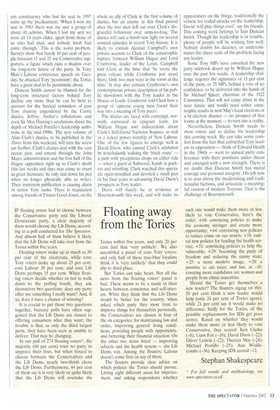Floating away from the Tories
IF floating voters had to choose between the Conservative party and the Liberal Democratic party, a clear majority of them would choose the Lib Dems, according to a poll conducted for The Spectator. And almost half of them believe it likely that the Lib Dems will take over from the Tories within five years.
Floating voters make up as much as 30 per cent of the electorate, while core Tory voters make up about 25 per cent, core Labour 30 per cent, and core Lib Dems perhaps 15 per cent. When floating voters decide whether or not to walk down to the polling booth, they ask themselves two questions: does any party offer me something I really want? And, if so, does it have a chance of winning?
It is crucial to put those two questions together, because polls have often suggested that the Lib Dems are closest to offering consumers what they want; the trouble is that, as only the third largest party, they have been seen as unable to deliver. That may be changing.
In our poll of 274 floating voters*, the majority (60 per cent) trust no party to improve their lives, but when forced to choose between the Conservatives and the Lib Dems, nearly two-thirds chose the Lib Dems. Furthermore, 44 per cent of them say it is very likely or quite likely that the Lib Dems will overtake the Tories within five years, and only 20 per cent find that 'very unlikely'. We also assembled a panel of core Tory voters: and only half of these true-blue loyalists think it is 'very unlikely' that they could slip to third place.
But Tories can take heart. Not all the news from the floating voters' panel is bad. There seems to be a tussle in their hearts between conscience and self-interest. While they think that the Lib Dems would be better for the country, when asked which party they most trust to improve things for themselves personally, the Conservatives are chosen in four of the six categories: for maintaining law and order, improving general living conditions, providing people with opportunity, and bettering their financial situation. On the other two items listed — improving schools and the health system — the Lib Dems win. Among the floaters, Labour doesn't come first on any of them.
The floaters provide clear advice on which policies the Tories should pursue. Listing eight different areas for improvement, and asking respondents whether each one would make them more or less likely to vote Conservative, here's the order: +68: convincing policies to make the economy stronger and create more opportunity; +64: convincing new policies to reduce crime on our streets; +58: radical new policies for funding the health service; +51: convincing policies to help the vulnerable; +29: becoming the party of freedom and reducing the nanny state; +25: a more modern image; +20: a promise to cut taxes; and last, at -10: ensuring more candidates are women and people from ethnic minorities, Should the Tories get themselves a new leader? The floaters zigzag on this: 50 per cent think a new leader would help (only 24 per cent of Tories agree), while 21 per cent say it would make no difference. Sadly for the Tories, all the possible replacements for IDS get poor scores. Rated on whether they would make them more or less likely to vote Conservative, they scored: Ken Clarke (-8); Liam Fox (-18); David Davis (-22): Oliver Letwin (-22); Theresa May (-24); Michael Portillo (-25); Ann Widdecombe (-36). Keeping IDS scored -12.
Stephan Shakespeare
For full results and methodology, see www.spectatorco.uk.




































































 Previous page
Previous page